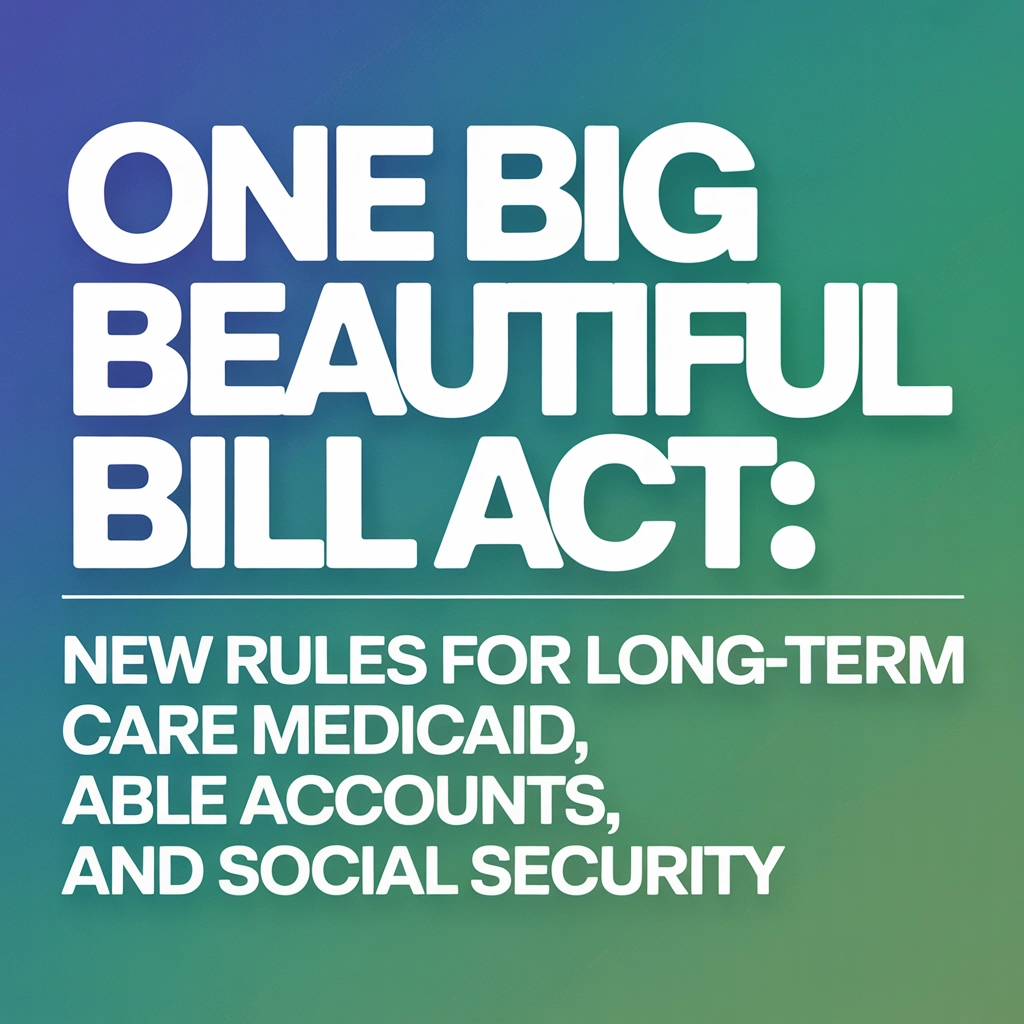One Big Beautiful Bill Act: New Rules for Long-Term Care Medicaid, ABLE Accounts, and Social Security

When President Trump signed the One Big Beautiful Bill Act (OBBBA) in July 2025, it sent ripples through the estate planning and eldercare communities. While the law is now official, many provisions will roll out gradually between 2026 and 2028. Key federal agencies—such as the IRS, CMS, and SSA—are expected to release implementing guidance over the coming months. This sweeping legislation doesn't just extend tax cuts: it fundamentally changes how families plan for long-term care, manage disabilities, and prepare for retirement.
If you're caring for aging parents, supporting a loved one with disabilities, or planning your own future, these changes will likely impact you. Let's break down what you need to know in plain English.
The Big Picture: What Is the One Big Beautiful Bill Act?
The OBBBA is a $3.4 trillion piece of legislation that primarily extends the 2017 tax cuts while making significant changes to federal programs. Think of it as a massive financial reshuffling that affects everything from your estate planning strategy to your loved one's Medicaid eligibility.
The most headline-grabbing change? The federal estate tax exemption jumps to $15 million per person starting in 2026. But for most families, the real impact lies in the Medicaid, ABLE account, and Social Security provisions.

Estate Planning Gets a Major Boost
Starting January 1, 2026, individuals can pass $15 million to their heirs without federal estate taxes: up from the current $13.61 million. For married couples, that means $30 million in combined exemptions.
This change creates both opportunities and urgency. While more families will escape federal estate taxes, state estate taxes may still apply. California doesn't have a state estate tax, but if you own property in other states, you'll need to consider their rules.
What this means for you: If your estate is valued between $13.99 million and $15 million, you've gained breathing room. But don't assume you can coast: estate planning still requires careful attention to state laws, income taxes, and family dynamics.
Long-Term Care Medicaid: Tighter Rules Ahead
The OBBBA introduces several changes to Medicaid that make qualifying for long-term care more challenging. These changes roll out gradually, giving families time to prepare.
Note: The Centers for Medicare & Medicaid Services (CMS) is expected to issue further clarification on how states must apply the $1 million home equity cap, particularly in community property states like California.
Shorter Lookback Period for Coverage
Starting January 1, 2027, Medicaid's retroactive coverage period shrinks from 90 days to 60 days. This means if your loved one needs nursing home care but hasn't applied for Medicaid yet, you have 30 fewer days to get coverage for past expenses.
Why this matters: Nursing home costs average $8,000-$12,000 per month in California. That extra month of uncovered expenses could cost your family $10,000 or more.
$1 Million Home Equity Cap
Beginning January 1, 2028, all states must use a uniform $1 million limit for home equity when determining Medicaid eligibility for long-term care. Currently, some states allow higher limits or use creative workarounds.

This change particularly affects families in high-cost areas like the Bay Area or Los Angeles, where million-dollar homes are common. If your family home is worth more than $1 million, your loved one may not qualify for Medicaid long-term care benefits.
Planning tip: Consider strategies like home equity conversions, family limited partnerships, or strategic gifting well before care is needed. Remember, Medicaid has a five-year lookback period for most transfers.
ABLE Accounts: Finally, Some Good News
While Medicaid rules tighten, the OBBBA significantly improves ABLE accounts for individuals with disabilities. These tax-advantaged savings accounts help families save for disability-related expenses without jeopardizing government benefits.
Permanent Improvements
The Act makes several temporary provisions permanent:
- ABLE-to-Work: Working individuals with disabilities can contribute above the standard annual limit based on their earnings
- 529 Rollover Authority: Families can roll unused 529 education funds into ABLE accounts tax-free
- Saver's Credit Eligibility: ABLE contributions now permanently qualify for federal tax credits
Enhanced Benefits Starting 2027
Beginning in 2027, the Saver's Credit limit increases, potentially providing up to $1,050 in tax credits for ABLE account contributions. The Act also opens the door for higher annual contribution limits in the future. Final contribution limits for 2027 and beyond may be subject to inflation adjustments and additional IRS rulemaking. Families should monitor Treasury updates to ensure full compliance.
What this means: Families supporting loved ones with disabilities have more flexibility to save and less worry about losing benefits. If you have unused 529 funds, rolling them into an ABLE account might make sense.
Social Security and Senior Benefits
The OBBBA includes several provisions specifically designed to help seniors manage rising costs:
Enhanced Standard Deduction for Seniors
From 2025 through 2028, seniors (age 65 and older) receive an additional standard deduction beyond the normal age-based increase. This provides immediate tax relief for older Americans on fixed incomes.
Social Security Administration Changes
While specific details are still emerging, Administrative changes to Social Security will be phased in over several years and may vary depending on congressional appropriations and SSA operational readiness. These changes primarily focus on administrative efficiency rather than benefit cuts.

What This Means for Your Family
These changes create both challenges and opportunities, depending on your situation:
If you're caring for aging parents:
- Start Medicaid planning conversations now, especially if the family home is worth more than $1 million
- Consider long-term care insurance as Medicaid becomes harder to qualify for
- Review estate planning documents to take advantage of higher exemptions
If you support someone with disabilities:
- Maximize ABLE account contributions, especially if they work
- Consider rolling 529 funds into ABLE accounts if education isn't the priority
- Take advantage of the enhanced Saver's Credit starting in 2027
If you're planning your own retirement:
- Review your estate plan in light of the $15 million exemption
- Consider the timing of major financial decisions around the implementation dates
- Factor in the additional standard deduction for tax planning
Action Steps for 2025 and Beyond
Don't wait for these changes to catch you off guard. Here's what to do now:
- Review your estate plan before 2026 to optimize for the new exemption amounts
- Assess Medicaid vulnerability if long-term care might be needed after 2028
- Evaluate ABLE account opportunities if disability affects your family
- Plan major financial moves around the staggered implementation dates
- Consider long-term care insurance as Medicaid access tightens

Looking Ahead: The Implementation Timeline
These changes don't all happen at once. Here's when to expect each:
- January 1, 2026: $15 million estate tax exemption takes effect
- January 1, 2027: Medicaid retroactive coverage reduced to 60 days
- January 1, 2027: Enhanced ABLE account Saver's Credit begins
- January 1, 2028: $1 million home equity cap for Medicaid
This staggered timeline gives families time to plan and adjust strategies as needed.
The Bottom Line
The One Big Beautiful Bill Act represents the most significant changes to estate planning and eldercare policy in years. While the $15 million estate tax exemption grabs headlines, the Medicaid and ABLE account changes will impact far more families.
The key is preparation. Whether you're helping aging parents, supporting a loved one with disabilities, or planning your own future, understanding these changes now gives you time to make informed decisions.
Don't navigate these complex changes alone. Professional guidance can help you understand how these new rules affect your specific situation and develop strategies that protect your family's financial future.
Disclaimer: While the OBBBA has been signed into law, many technical details—particularly regarding Medicaid eligibility and ABLE account adjustments—will depend on forthcoming regulations from federal agencies. This article is current as of September 2025, and readers should consult professional advisors or federal sources for the latest updates.
For our Chinese-speaking clients, we offer consultations and resources in Mandarin and Cantonese. Contact us to discuss how these federal changes might impact your family's planning.
Source Reference: This article draws from the White House website article, "President Trump has signed the One Big Beautiful Bill into Law" https://www.whitehouse.gov/obbb/
If you're interested in Estate Planning or want to learn how these changes might affect your family's future, you can schedule a meeting with us here: https://hsiaolaw.com/book-a-call/



